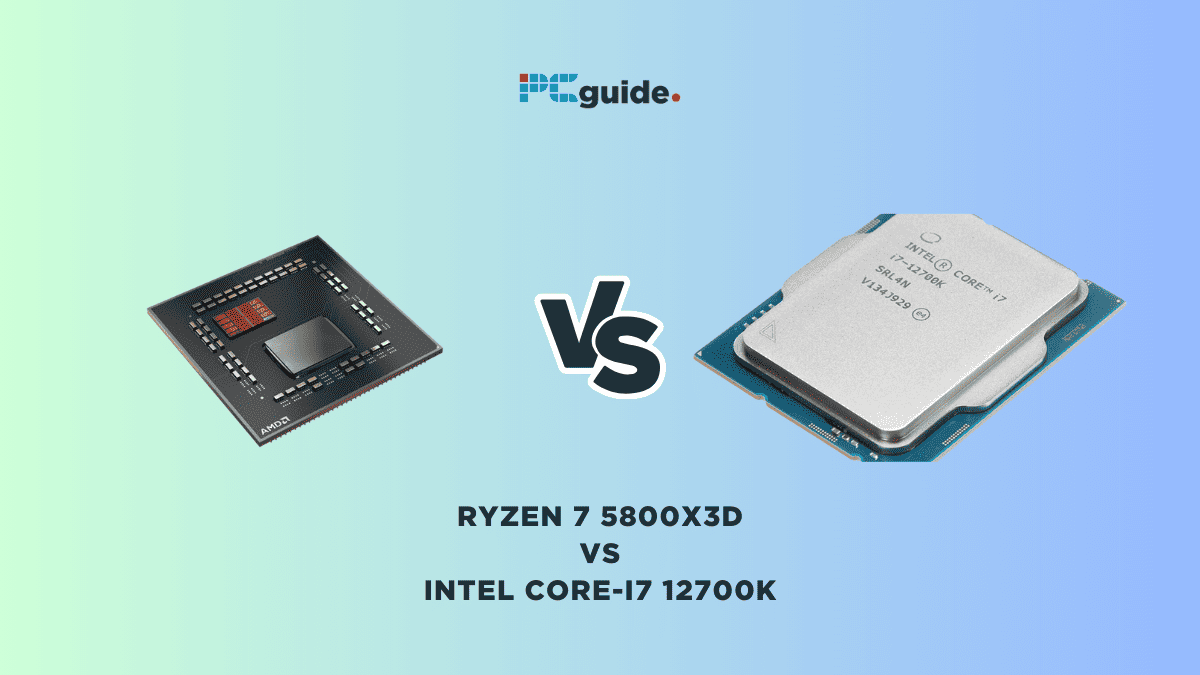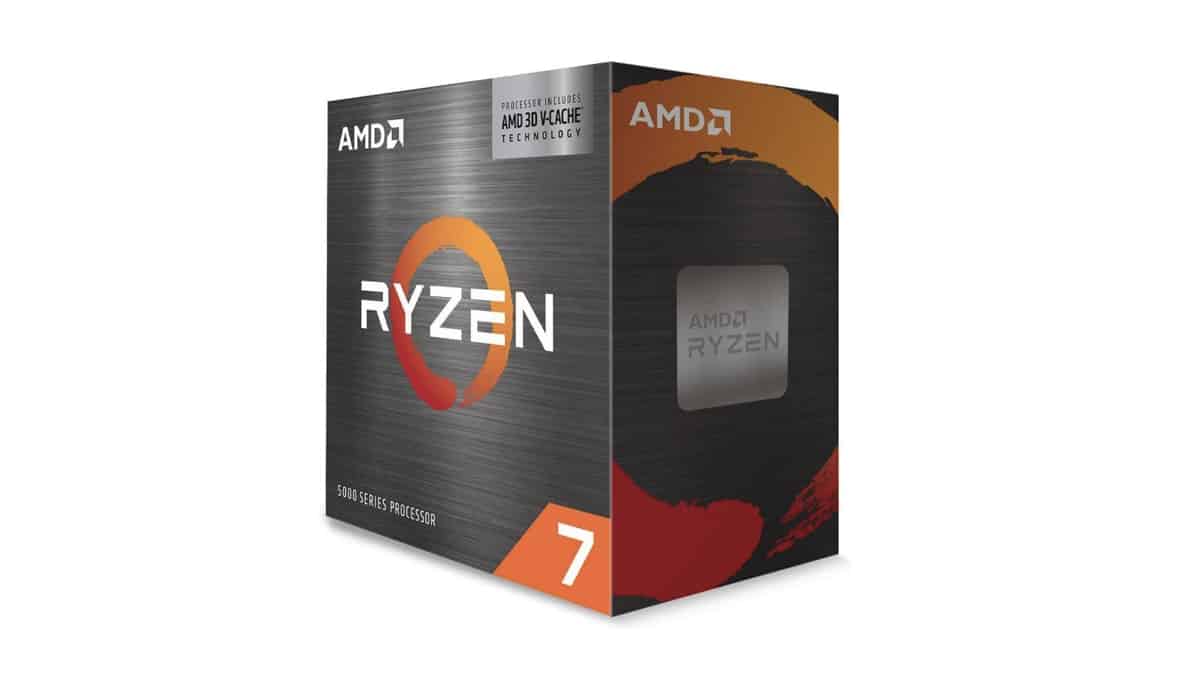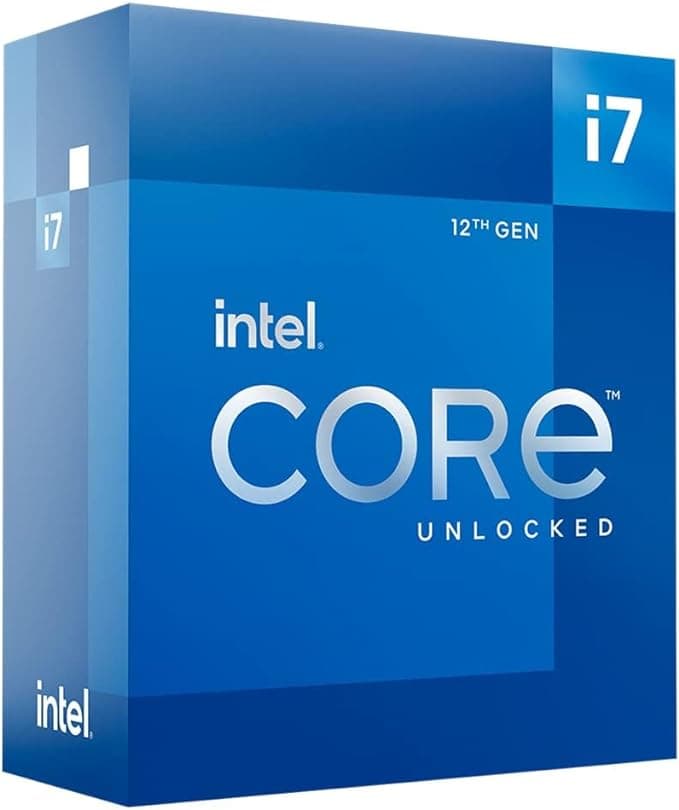Ryzen 7 5800X3D vs Intel Core-i7 12700K – Is it close?

Table of Contents
In the high-stakes world of gaming CPUs, the Ryzen 7 5800X3D vs. Intel Core-i7 12700K comparison is a hot topic. Launched on April 20, 2022, AMD’s Ryzen 7 5800X3D has been making waves for its impressive specs and performance, positioning itself as a top contender in the gaming CPU arena. Similarly, Intel’s Core-i7 12700K stands tall with its high-performance benchmarks, setting a standard that’s difficult to match.
But how does the Ryzen 7 5800X3D fare against such a formidable opponent? Is it a close match, or does one offer better value and graphics performance? Let’s dive deep into the specifics of these two powerhouse CPUs and see how they stack up against each other.
Prime Day is finally here! Find all the biggest tech and PC deals below.
- Sapphire 11348-03-20G Pulse AMD Radeon™ RX 9070 XT Was $779 Now $739
- AMD Ryzen 7 7800X3D 8-Core, 16-Thread Desktop Processor Was $449 Now $341
- ASUS RTX™ 5060 OC Edition Graphics Card Was $379 Now $339
- LG 77-Inch Class OLED evo AI 4K C5 Series Smart TV Was $3,696 Now $2,796
- Intel® Core™ i7-14700K New Gaming Desktop Was $320.99 Now $274
- Lexar 2TB NM1090 w/HeatSink SSD PCIe Gen5x4 NVMe M.2 Was $281.97 Now $214.98
- Apple Watch Series 10 GPS + Cellular 42mm case Smartwatch Was $499.99 Now $379.99
- ASUS ROG Strix G16 (2025) 16" FHD, RTX 5060 gaming laptop Was $1,499.99 Now $1,274.99
- Apple iPad mini (A17 Pro): Apple Intelligence Was $499.99 Now $379.99
*Prices and savings subject to change. Click through to get the current prices.
Ryzen 7 5800X3D vs Intel Core-i7 12700K: Specs comparison
The specifications of both these processors look very close, even on paper. However, as we delve deeper into the specifications of the Ryzen 7 5800X3D and the Intel Core-i7 12700K, the intricacies of these processors become apparent.
The CPU socket, a pivotal element in system compatibility, diverges between the two contenders. The Ryzen 7 5800X3D is engineered for the AM4 socket. On the other hand, the Intel Core-i7 12700K is designed for the LGA 1700 socket. This means a significant distinction in motherboard compatibility.
Moving to chip size, the Ryzen 7 5800X3D leverages a 7 nm architecture, showcasing AMD’s prowess in nanoscale manufacturing. Although Intel has produced chips with 5 nm size, the Core i-7 12700K boasts a 10 nm architecture.
The multitasking capabilities of these processors are close, too. The Ryzen 7 5800X3D boasts eight performance cores and 16 threads. The primary difference the Intel chip has with the Ryzen 7 5800X3D is that it features four efficiency cores and eight performance cores. As for the threads, the Intel Core i-7 12700K has 20 threads, which means better multitasking capabilities.
The table below shows the specs comparison of Ryzen 7 5800X3D vs. Intel Core-i7 12700K:
| Specs | Ryzen 7 5800X3D | Intel Core-i7 12700K |
|---|---|---|
| CPU socket | AM4 | LGA 1700 |
| Chip size | 7 nm | 10 nm |
| Cores | 8 performance cores | 8 performance cores + 4 efficiency cores |
| Threads | 16 | 20 |
| P-core base | 3.4 GHz | 3.6 GHz |
| P-core boost | 4.5 GHz | 5.0 GHz |
| E-core base | NA | 2.7 GHz |
| E-core boost | NA | 3.8 GHz |
| L3 cache memory | 96 MB | 25 MB |
| L2 cache memory | 4 MB | 12 MB |
| TDP | 105 Watts | 125 Watts |
| RAM speed | 3200MHz | 4800MHz |
| DDR memory support | DDR4 | DDR5 |
| Price | $449 | $409 |
While the competition is close for most specs, the AMD chip surpasses Intel's in terms of L3 cache memory. the Ryzen 7 5800X3D comes equipped with 96 MB of L3 cache and 4 MB of L2 cache. It is close to 4 times the L3 cache memory of Intel Core i-7 12700K, which features 25 MB L3 and 12 MB L2 cache memory.
The Ryzen 7 5800X3D operates at a base frequency of 3.4 GHz, with a boost clock reaching 4.5 GHz. On the other hand, the Intel Core-i7 12700K starts at a base frequency of 3.6 GHz, with a boost clock soaring to 5.0 GHz. These figures offer insights into the raw processing power each CPU can deliver.
Ryzen 7 5800X3D vs. Intel Core-i7 12700K: Performance showdown
When it comes to gaming prowess, the Ryzen 7 5800X3D from AMD stands out as a formidable contender. It’s not just AMD’s fastest gaming CPU; it also surpasses the Ryzen 9 5900X in gaming performance. According to a Reddit discussion, the Ryzen 7 5800X3D boasts an 18% improvement in average FPS and a 22% increase in 1% lows compared to its counterparts.
Intel’s Core-i7 12700K, a standout in Intel’s lineup, excels in multi-threaded tasks like video editing and 3D rendering, thanks to its 12 cores and 20 threads. However, in the gaming arena, AMD’s Ryzen 7 5800X3D gains an edge, primarily due to its superior L3 cache memory.
Analyzing single-core performance and memory efficiency
Single-core performance is critical for gaming, and here, the Ryzen 7 5800X3D shines with its high boost clock and Zen 3 architecture. This architecture not only ensures efficient performance but also supports faster memory, enhancing overall gaming experiences.
Power consumption and thermal design
Another aspect to consider is power consumption and thermal design power (TDP). The Ryzen 7 5800X3D, with its optimized power consumption, offers a balance between performance and energy efficiency. This efficiency is crucial for maintaining higher clock speeds without significant thermal challenges.
PCIe and hardware compatibility
Both CPUs support PCIe, but the Ryzen 7 5800X3D’s compatibility with a wide range of hardware, including various memory channels, gives it a slight advantage in terms of system flexibility and future-proofing.
Integrated graphics and frames
While the Intel Core-i7 12700K comes with an integrated GPU (iGPU), which can be beneficial for users without a dedicated GPU, the focus here is on gaming performance where dedicated GPUs are typically used. In this scenario, the frame rates achieved by the Ryzen 7 5800X3D in various gaming environments are noteworthy.
In conclusion, while the Intel Core-i7 12700K excels in multi-threaded applications and offers a robust iGPU, the Ryzen 7 5800X3D takes the lead in gaming performance, thanks to its efficient architecture, faster memory support, and superior single-core performance. This makes the Ryzen 7 5800X3D a top choice for gamers seeking the best in-game experiences.
Ryzen 7 5800X3D vs. Intel Core-i7 12700K: Price and value
When comparing the Ryzen 7 5800X3D and the Intel Core-i7 12700K, price and value play a pivotal role. Both CPUs offer compelling features, but their cost-effectiveness is a key consideration for any buyer.
The Ryzen 7 5800X3D, launched at an MSRP of $449, offers a competitive edge with its advanced 3D V-Cache technology. This innovation is designed to deliver better performance, especially in gaming and intensive multitasking scenarios.
In contrast, the Intel Core-i7 12700K, priced slightly lower at $409, brings its strengths to the table. Known for its high benchmark results, this CPU is a strong contender in multi-threaded applications and offers excellent compatibility with a range of motherboards, which could influence overall motherboard pricing.
Benchmarking the CPUs
Benchmark results are crucial in a CPU comparison. They provide tangible data on how each processor performs under various conditions. Both the Ryzen 7 5800X3D and the Intel Core-i7 12700K have their strengths, but how they translate into real-world performance is what matters most to users.
In conclusion, while the Ryzen 7 5800X3D and Intel Core-i7 12700K are priced similarly, their value extends beyond just the MSRP. It encompasses performance, compatibility with other components, and how they meet the specific needs of users, whether for gaming, content creation, or general productivity.
Which CPU has faster physical cores, the Ryzen 7 5800X3D or the Intel Core-i7 12700K?
Both the Ryzen 7 5800X3D and the Intel Core-i7 12700K feature physical cores, meaning they possess actual physical cores on the die. The Ryzen 7 5800X3D has 8 physical cores, while the Intel Core-i7 12700K has 12 physical cores.
Which CPU has higher CPU speed, the Ryzen 7 5800X3D or the Intel Core-i7 12700K?
The Intel Core-i7 12700K generally has higher CPU speed due to its higher boost clock speed of up to 5 GHz compared to the Ryzen 7 5800X3D’s boost clock speed of up to 4.5 GHz. However, the Ryzen 7 5800X3D’s efficient architecture and faster memory support often translate into better real-world performance in gaming workloads.
Final verdict
The face-off between Ryzen 7 5800X3D vs. Intel Core-i7 12700K is extremely close. The Intel Core-i7 12700K’s higher core count may give it an edge in certain multi-threaded workloads, while the Ryzen 7 5800X3D, with its proven Zen 3 architecture, promises strong single-threaded performance.
Hence, the ultimate winner of this battle will be the one that suits your requirements and preferences.


